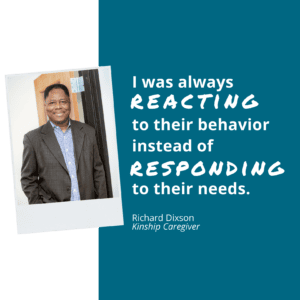Richard Dixson and his wife were close to retirement when they became kinship care providers for their first grandchild. All at once, visions of downsizing and traveling vanished as the empty-nest Dixsons became kinship caregivers.
Throughout the United States, many grandparents are parenting their grandchildren through kinship care. Richard’s story provides hope and encouragement to grandparents who find themselves starting over as a parent.
In 2013, Richard and his wife welcomed their first granddaughter into the world. Their daughter, the child’s mother, was emotionally, physically, and financially unable to care for her child, so the Dixsons stepped in to provide a safe and loving home.
Two years later, their second granddaughter was born. The Dixsons again took on the responsibility of their second grandchild. Another two years later, their twin grandsons were born. Within less than six years, the Dixson went from empty-nesters to the parents of four young children. They were now not only grandparents but kinship care providers.
Over 30 years ago, Richard and his wife had parented three children of their own, whom they had adopted from infancy. They knew how they had parented the first time and wanted things to be different the second time. “We knew we wanted to do a better job grandparenting,” Richard describes.
Shortly after opening their home for kinship care to their grandchildren, the Dixsons learned about Trust-Based Relational Intervention®. They learned new strategies to parent their grandchildren who had experienced trauma. And they did so with an open mind.

“As a result,” Richard explains, “I learned that I had unresolved trauma because my grandchildren’s trauma was triggering my own.”
Richard recognized that he was constantly reacting to his grandchildren’s behavior rather than responding to their needs. “That was a big mind shift for me to go from a traditional way of parenting to a revolutionary type of parenting,” he insists.
With their first three children, who are now adults, the Dixsons embraced a traditional parenting style. They had not known about any other options. But now, the Dixsons were on a “transformational journey” of learning how to be parents again.
Richard, a grandparent and kinship care provider, wanted to be trauma informed. “This time,” Richard explains, “we had the tools. We had the research. We had the training.”
The Dixsons understood that their grandchildren had incurred trauma, both in how they came into the world and by not being raised by their biological mother. As a result of trauma, their brains developed differently. Things such as “cause and effect” were not as easily understood. And the children were almost always in a fight, flight, or freeze mode.
With these new understandings, the Dixsons could approach kinship care parenting with a trauma-informed lens.
Richard is honest about the difficulties of parenting young grandchildren. He often sees people’s puzzled expressions as they try to determine whether he is a grandparent or an older parent.

When people know that Richard is raising his grandchildren, they often offer weak encouragement, such as, “They’ll keep you young!” or “God will provide a way!”
“The fact of the matter is that we live exhausted, joyful lives,” Richard admits. “We love raising our grandchildren.”
The Dixsons would not trade their situation for anything. However, there are still moments when they think about what it would be like to live child-free like many of their peers. Richard knows of retired friends who are traveling and enjoying other benefits of an empty nest.
But at the end of the day, Richard remembers his why: “I get to provide my grandchildren a safe home. I get to influence their future. And I get to ensure my legacy will move forward in a healthy way. That gives me great joy.”
Richard’s parenting style completely changed once he became a kinship placement for his grandchildren. Based on his experience, he founded the Drama-Free Parenting Academy. There, parents can find parenting courses and coaches to help them problem solve the parenting challenges they face.
One of the most important things Richard believes kinship care grandparents can do is find support. “A lot of times, [kinship care providers] are trying to do it on their own,” Richard explains.
He encourages grandparents and other kinship care providers to attend conferences where they can connect with others in similar situations. “Sharing stories and getting input from others in your situation is so helpful,” he continues.
And do not wait until you have hit rock bottom to seek help. Richard gives the illustration of a car’s “check engine” light. He is guilty of ignoring the red warning light until it is too late. The same is often true for those parenting children who have experienced trauma.
Learning about trauma-informed parenting and other strategies is crucial. “Be proactive now so that you can be equipped for when that time comes [that you need the information] because it will come,” he expresses.
To learn more about kinship care and how to support kinship families, visit WaitNoMore.org.
The post Providing Kinship Care as a Grandparent appeared first on Focus on the Family.
Continue reading...
Throughout the United States, many grandparents are parenting their grandchildren through kinship care. Richard’s story provides hope and encouragement to grandparents who find themselves starting over as a parent.
From an Empty Nest to a Family of Six
In 2013, Richard and his wife welcomed their first granddaughter into the world. Their daughter, the child’s mother, was emotionally, physically, and financially unable to care for her child, so the Dixsons stepped in to provide a safe and loving home.
Two years later, their second granddaughter was born. The Dixsons again took on the responsibility of their second grandchild. Another two years later, their twin grandsons were born. Within less than six years, the Dixson went from empty-nesters to the parents of four young children. They were now not only grandparents but kinship care providers.
Over 30 years ago, Richard and his wife had parented three children of their own, whom they had adopted from infancy. They knew how they had parented the first time and wanted things to be different the second time. “We knew we wanted to do a better job grandparenting,” Richard describes.
Becoming Trauma-Informed Grandparents
Shortly after opening their home for kinship care to their grandchildren, the Dixsons learned about Trust-Based Relational Intervention®. They learned new strategies to parent their grandchildren who had experienced trauma. And they did so with an open mind.

“As a result,” Richard explains, “I learned that I had unresolved trauma because my grandchildren’s trauma was triggering my own.”
Richard recognized that he was constantly reacting to his grandchildren’s behavior rather than responding to their needs. “That was a big mind shift for me to go from a traditional way of parenting to a revolutionary type of parenting,” he insists.
With their first three children, who are now adults, the Dixsons embraced a traditional parenting style. They had not known about any other options. But now, the Dixsons were on a “transformational journey” of learning how to be parents again.
Richard, a grandparent and kinship care provider, wanted to be trauma informed. “This time,” Richard explains, “we had the tools. We had the research. We had the training.”
The Dixsons understood that their grandchildren had incurred trauma, both in how they came into the world and by not being raised by their biological mother. As a result of trauma, their brains developed differently. Things such as “cause and effect” were not as easily understood. And the children were almost always in a fight, flight, or freeze mode.
With these new understandings, the Dixsons could approach kinship care parenting with a trauma-informed lens.
The Challenges of Kinship Care for a Grandparent
Richard is honest about the difficulties of parenting young grandchildren. He often sees people’s puzzled expressions as they try to determine whether he is a grandparent or an older parent.

When people know that Richard is raising his grandchildren, they often offer weak encouragement, such as, “They’ll keep you young!” or “God will provide a way!”
“The fact of the matter is that we live exhausted, joyful lives,” Richard admits. “We love raising our grandchildren.”
The Dixsons would not trade their situation for anything. However, there are still moments when they think about what it would be like to live child-free like many of their peers. Richard knows of retired friends who are traveling and enjoying other benefits of an empty nest.
But at the end of the day, Richard remembers his why: “I get to provide my grandchildren a safe home. I get to influence their future. And I get to ensure my legacy will move forward in a healthy way. That gives me great joy.”
Helping Other Parents Thrive
Richard’s parenting style completely changed once he became a kinship placement for his grandchildren. Based on his experience, he founded the Drama-Free Parenting Academy. There, parents can find parenting courses and coaches to help them problem solve the parenting challenges they face.
One of the most important things Richard believes kinship care grandparents can do is find support. “A lot of times, [kinship care providers] are trying to do it on their own,” Richard explains.
He encourages grandparents and other kinship care providers to attend conferences where they can connect with others in similar situations. “Sharing stories and getting input from others in your situation is so helpful,” he continues.
And do not wait until you have hit rock bottom to seek help. Richard gives the illustration of a car’s “check engine” light. He is guilty of ignoring the red warning light until it is too late. The same is often true for those parenting children who have experienced trauma.
Learning about trauma-informed parenting and other strategies is crucial. “Be proactive now so that you can be equipped for when that time comes [that you need the information] because it will come,” he expresses.
To learn more about kinship care and how to support kinship families, visit WaitNoMore.org.
The post Providing Kinship Care as a Grandparent appeared first on Focus on the Family.
Continue reading...





